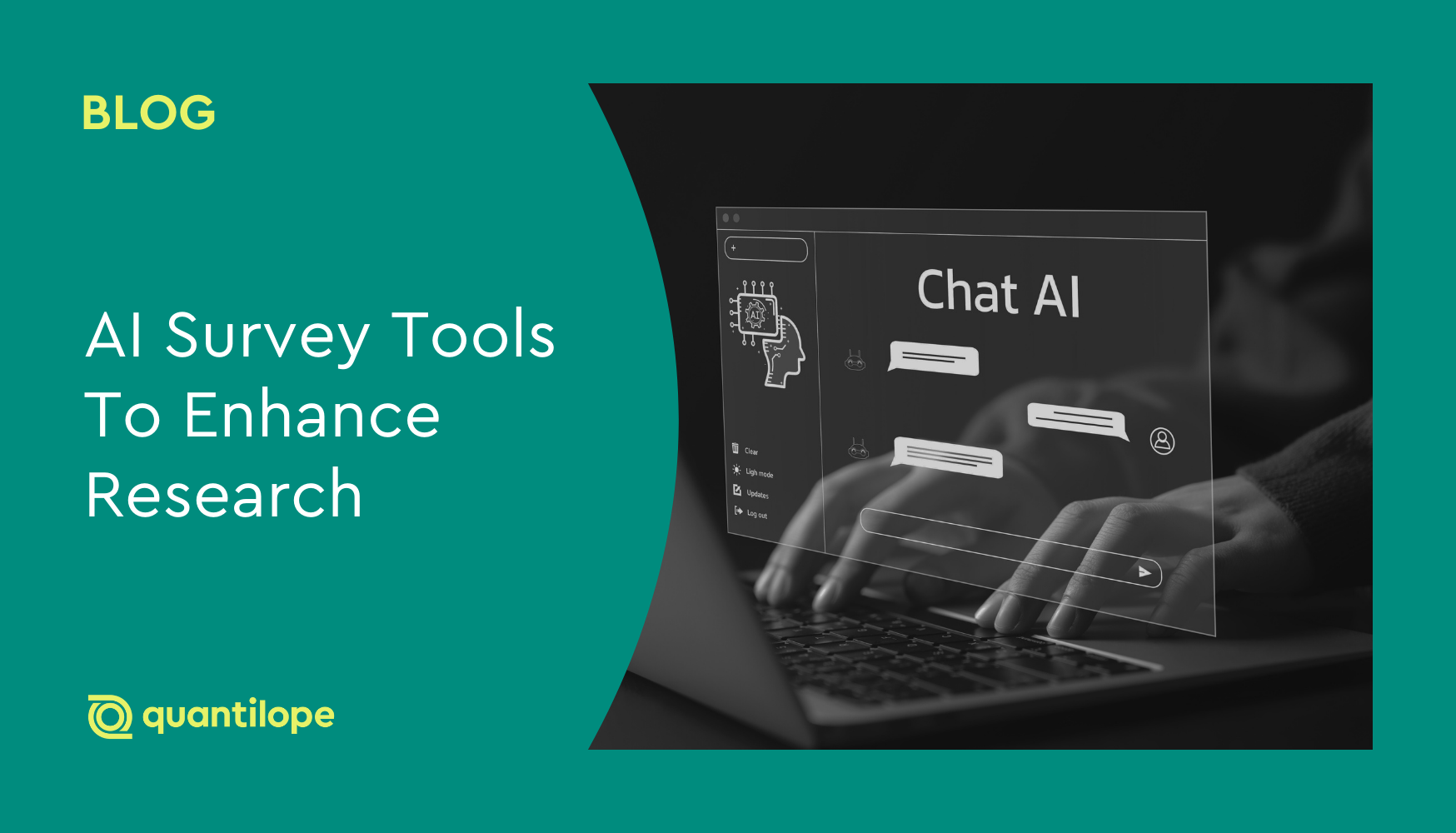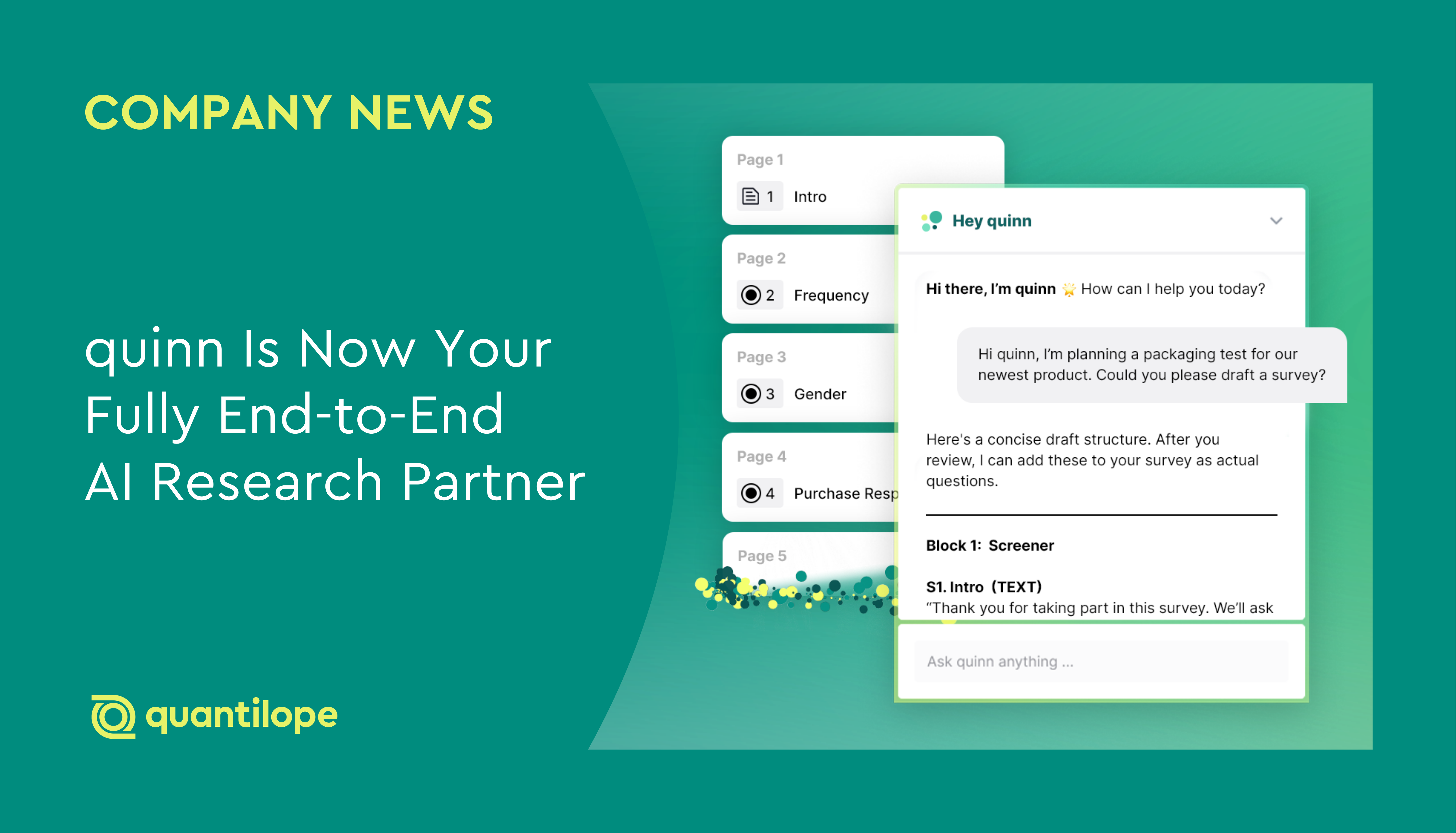10 AI survey tools by use case
To help narrow down your search for an AI tool that will fit your needs and answer your business questions, below we’ve put together a list of some of the best AI survey tools on the market - categorized by their strengths and ideal use cases.
For market research in general:
-
quantilope:
quantilope’s AI Research Partner - quinn (integrated directly into quantilope's Consumer Intelligence Platform), uses natural language processing (NLP) and Generative AI (GenAI) to support researchers throughout their end-to-end research process. quantilope platform users can chat directly with quinn for research support and to automatically uncover insights, summarize results, and generate dashboard reports. With just the press of a ‘Hey quinn’ button or a simple chat prompt, quinn provides instant guidance, suggestions, inputs, and outputs to get more done in less time. quinn is capable of supporting even the most complex, advanced method projects - so whether you’re looking for help on a basic U&A study or an intricate Conjoint analysis, quinn is your always-available collaborative partner.
-
Zoho Analytics:
Zoho Analytics incorporates Generative and Predictive AI to help researchers optimize their surveys for better completion rates. With this tool, researchers can converse in natural language with their conversational assistant ‘Ask Zia’, predict future trends/forecasts, detect anomalies in their data set, and simulate complex scenarios. This is a good AI-driven tool for basic data analysis and reporting features.
For automated reporting:
-
Tableau:
Tableau is a popular data visualization and business intelligence platform that leverages AI to help users create interactive and dynamic reports. It offers features like natural language processing (NLP) to allow users to ask questions about their data in plain English and receive instant visualizations. Tableau also uses AI to suggest relevant charts and graphs, identify outliers and trends, and generate narratives to explain the data.
-
Looker Studio:
Looker Studio (previously Google Data Studio) allows users to connect to various data sources, including survey platforms, and create interactive dashboards with automated reporting features. This tool uses AI to help visualize data, suggest relevant charts and graphs, and provide insights into key trends and patterns. With this information, users can create reports that are automatically updated with the latest data.
For customer feedback:
-
Chattermill:
Chattermill is a platform that analyzes feedback from various sources (surveys, reviews, support tickets) to identify customer trends and sentiment. With this tool, researchers can prioritize issues based on customer impact and link insights to key business metrics. -
SurveySparrow:
SurveySparrow allows researchers to engage with their audience through conversational surveys on WhatsApp. This AI-powered chatbot can engage with customers, send personalized messages, answer questions, and collect feedback in a conversational manner.
For employee engagement:
-
Culture Amp:
Culture Amp is an employee experience platform that uses Generative AI to produce summaries of employee feedback, workplace culture themes, employee morale, and potential areas for improvement - all leveraged to reduce employee turnover. -
TINYpulse:
TINYpulse uses AI to analyze employee sentiment and identify potential issues before they escalate. By tracking trends over time, this tool can predict potential risks like employee burnout or disengagement, allowing companies to take proactive steps to improve employee well-being.
For sentiment analysis:
-
Brand24:
Brand24 is a social listening and reputation management tool that uses AI-powered sentiment analysis to monitor online conversations about a brand. It can track mentions across social media sites, blogs, forums, and news sites - identifying positive, negative, and neutral sentiment. Businesses can use this tool to understand public perception, identify potential PR crises, and track the effectiveness of their marketing campaigns. -
Repustate:
Repustate focuses on multilingual sentiment analysis, making it a valuable tool for global businesses. It uses AI technology to accurately analyze text in multiple languages, identifying subtle differences in sentiment across cultures. This allows businesses to gather insights from diverse customer bases and tailor their global business strategies accordingly.
Back to Table of Contents
Can you customize AI survey questions?
The ability to customize AI survey questions varies from tool to tool. Some AI survey tools offer pre-built templates and AI-generated surveys that can be further customized to fit your specific needs. Others allow you to create your own surveys from scratch, while still leveraging AI for question optimization and data analysis. This is something to consider when choosing your AI survey tool, ensuring it can provide a level of customization that will fit your needs.
For example, quantilope’s AI Research Partner, quinn, offers instant chart headlines and report summaries with just the click of a button - even taking into consideration the style and tone of voice used throughout the study's dashboard. Researchers can choose to use quinn’s outputs as is, or further edit them by adding in their own language, deleting what they don’t need, and so on. The same is true for survey inputs, where quinn can instantly generate a suggested list of dynamic elements for an implicit association test, or a list of Category Entry Points to use in a Better Brand Health Tracking study, but researchers always have the final say in what’s included in the final survey.
Back to Table of Contents
Benefits of using AI survey tools
If the above list is any indication, there’s no shortage of AI survey tools to choose from and the capabilities they offer. However, you may still wonder what the benefits are of actually using an AI tool. Below are a few ways these types of tools and technology can enhance your research approach.
- Optimized processes: AI technology automates tasks such as survey design, distribution, and analysis so that teams can work more efficiently - both in terms of time and money spent.
- Increased response rates: AI can personalize surveys and optimize question order to keep respondents engaged throughout, leading to higher completion rates.
- Reduced bias: AI can help eliminate human/researcher bias in survey design and data analysis, resulting in more accurate and objective results.
- Improved data quality: AI can quickly identify and flag inconsistencies or errors in survey responses. It can also uncover hidden patterns and trends during data collection, ensuring data integrity without a delay in getting insights.
- Enables data-driven decisions: In leveraging Generative and Predictive AI functionalities, research teams can make better business decisions based on accurate, unbiased, and actionable insights.
Back to Table of Contents
How does quantilope leverage AI?
quantilope is the AI-powered Consumer Intelligence Platform that offers the largest suite of automated, advanced methodologies and an integrated AI Research Partner - quinn. quinn, alongside quantilope’s legacy machine-learning algorithms, provides researchers with all the tools they need to design, launch, analyze, and report on consumer insights - all without ever leaving the platform.
With quantilope, research teams can expect:
- Automated survey creation: quantilope’s survey builder allows users to drag & drop whichever questions and advanced methods they need from a pre-programmed library, or leverage a (customizable) survey template for more of a head start.
- Real-time dashboards: After launching a survey (using any panel provider of your choice) monitor survey results in real-time, as respondents complete/submit their surveys. Any charts you’ve created will automatically update with any new data as soon as it’s available, and quinn can instantly regenerate new headlines and summaries on your interactive dashboards.
- Advanced analytics: quantilope uses AI algorithms on the backend to analyze complex survey data, identify key trends, and uncover hidden insights. Even researchers with no prior experience can easily navigate quantilope’s end-to-end platform for advanced findings to share with their stakeholders.
To learn more about how quantilope and its AI-driven features can streamline your research process, gain deeper insights from your data, and make more informed decisions, get in touch below!




